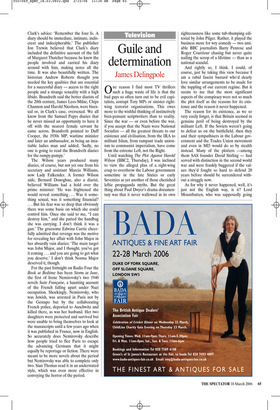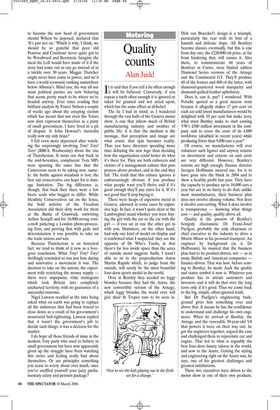Guile and determination
James Delingpole
One reason I find most TV thrillers such a huge waste of life is that the bad guys so often turn out to be evil capitalists, corrupt Tory MPs or sinister rightwing terrorist organisations. This owes more to the wishful thinking of instinctively bien-pensant scriptwriters than to reality. Since the war — or even before the war, if you accept that the Nazis were National Socialists — all the greatest threats to our existence and civilisation, from the IRA to militant Islam, from rampant trade unionism to communist imperialism, have come from the extreme Left, not the Right.
Until watching The Plot Against Harold Wilson (BBC2, Thursday), I was inclined to view the alleged plan of a right-wing coup to overthrow the Labour government sometime in the late Sixties or early Seventies as yet another of those cherished leftie propaganda myths. But the great thing about Paul Dwyer’s drama documentary was that it never wallowed in its own righteousness like some tub-thumping editorial by John Pilger. Rather, it played the business more for wry comedy — two amiable BBC journalists Barry Penrose and Roger Courtiour chasing but never quite nailing the scoop of a lifetime — than as a national scandal.
And rightly so, I think. I could, of course, just be taking this view because I am a rabid fascist bastard who’d dearly love similar arrangements to be made for the toppling of our current regime. But it seems to me that the most significant aspects of the conspiracy were not so much the plot itself as the reasons for its existence and the reason it never happened.
The reason for its existence, as we so very easily forget, is that Britain seemed in genuine peril of being destroyed by the militant Left. If the Soviets weren’t going to defeat us on the battlefield, then they and their sympathisers in the Labour government and the Trades Union movement and even in MI5 would do so by stealth instead. Many of the plotters —among them SAS founder David Stirling — had served with distinction in the second world war and were frankly buggered if the values they’d fought so hard to defend 20 years before should be surrendered without a struggle now.
As for why it never happened, well, it’s just not the English way, is it? Lord Mountbatten, who was supposedly going to become the new head of government should Wilson be deposed, declared that ‘It’s just not on.’ Which is why, I think, we should be so grateful that poor old Penrose and Courtiour never quite got to be Woodward and Bernstein. Imagine the meal the Left would have made of it if the story had come out in one go instead of in a trickle over 30 years. Maggie Thatcher might never have come to power, and we’d have a world economic ranking somewhere below Albania’s. Mind you, the way all our main political parties are now behaving that seems pretty much to be where we’re headed anyway. Ever since reading that brilliant analysis by Fraser Nelson a couple of weeks ago about the creeping statism which has meant that not even the Tories now dare represent themselves as a party of small government, I have lived in a pit of despair. Is John Howard’s Australia really now my only hope?
I felt even more depressed after watching the surprisingly involving Tory! Tory! Tory! (BBC4, Wednesday) about the rise of Thatcherism. It turns out that back in the mid-Seventies, complacent Tory MPs were spouting the same line that the Cameroons seem to be taking now, namely: the battle against socialism is lost; the best any conservative can hope for is damage limitation. The big difference is, though, that back then there were a few brave souls who begged to differ. While Heathite Conservatives sat on the fence, the bold activists of the Freedom Association did their dirty work for them at the Battle of Grunwick, outwitting Arthur Scargill and his 18,000-strong renta-mob picketing a London photo-processing firm, and proving that with guile and determination it was possible to take on the trade unions and win.
Because Thatcherism is an historical fact, we tend to think of it now as a foregone conclusion. What Tory! Tory! Tory! thrillingly reminded us was just how daring and innovative a movement it was. The decision to take on the unions; the experiment with restricting the money supply these were unpopular, risky strategems which took Britain into completely uncharted territory, with no guarantee of a successful outcome.
Nigel Lawson recalled at the time being asked what on earth was going to replace all the industries that had been forced to close down as a result of his government’s monetarist belt-tightening. Lawson replied that it wasn’t the government’s job to decide such things: it was a decision for the market.
I do hope all those friends of mine in the modern Tory party who used to believe in small government but have now apparently given up the struggle have been watching this series and feeling really bad about themselves. Or are principles something you cease to worry about over much, once you’ve snaffled yourself your juicy parliamentary salary and pension package?



















































































 Previous page
Previous page